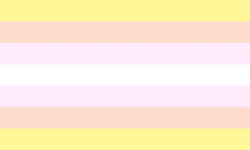Pangender
 Meaning Yellow: gender without reference to the binary; Light red: transition to genders related to female and male; Light violet/pink: combination of female and male; White: blend of all these genders; The colors are very light because white is the combination of all colors. | |
| Related identities | Polygender |
|---|---|
| Under the umbrella term | Multigender |
| Frequency | 0.4% |
| Click here to see alternative flags! | |
Pangender, or omnigender, is a gender identity in which a person either identifies as a countless number of separate identities that they are fluid between over time, or that they identify as one all encompassing identity. The genders that a pangender person has only includes genders within the person's own culture and life experience[1][2] (e.g. their genders would not include Fa'afafine unless they are Samoan; their genders would not include bordergender unless they have Borderline Personality Disorder).
A pangender person's identity may or may not include genders not currently recognized or known[1] and may or may not fluctuate in intensity or include differing intensities among the genders that the Pangender person encompasses. Thus a pangender person can also be genderfluid or genderflux. The combination of pangender and genderflux is called panflux.
Just like any other gender identity, pangender people can use any set of pronouns they choose or vary between pronouns depending on how they identify at the time.
An alternative term with a similar meaning is maxigender[3], since some people on Tumblr who don't identify as pangender argue that it is appropriative of culturally-specific and neurotype-specific genders. The reason for that, according to them, is that no one can identify as all genders, as this would include culturally-specific or neurotype-specific genders.[4][5][6]
Omnigender is sometimes used as a synonym for pangender[7][8], but sometimes is defined as experiencing almost all genders.[9] Omnigender is also sometimes used to mean "gender neutral"/"treating all genders equally".[10]
History[edit | edit source]
The use of "pangender" as a identity goes back at least to the 1990s, as stated in the preface to The Flock, a 1992 book by Lynn Wilson about dissociative identity disorder: "Some gender-nonconforming individuals call themselves androgynes, pan-gender, or non-binary."[11]
Pangender was mentioned as one of many valid nonbinary identities in the 2013 text Sexuality and Gender for Mental Health Professionals: A Practical Guide.[12]
In 2018, Washington state began to allow "X" gender markers on official documents[13], with the law stating that
| « | "X" means a gender that is not exclusively male or female, including, but not limited to, intersex, agender, amalgagender, androgynous, bigender, demigender, female-to-male, genderfluid, genderqueer, male-to-female, neutrois, nonbinary, pangender, third sex, transgender, transsexual, Two Spirit, and unspecified.[14] | » |
Popular news site The Daily Dot published an article "What it means to be pangender" on June 16, 2020.[15]
Please help expand this section.
Notable pangender people[edit | edit source]
See main article: Notable nonbinary people
There are many more notable people who have a gender identity outside of the binary. The following are only some of those notable people who specifically use the words "pangender", "maxigender", or "omnigender" for themselves.
Please help expand this section.
Pangender characters in fiction[edit | edit source]
See main article: Nonbinary gender in fiction
There are many more nonbinary characters in fiction who have a gender identity outside of the binary. The following are only some of those characters who are specifically called by the words "pangender", "maxigender", or "omnigender," either in their canon, or by their creators.
- In the sci-fi thriller novel Zero-G: Book 1 (by William Shatner and Jeff Rovin), Adsila Waters is described multiple times as "pan-gender" (used as both an adjective and a noun in the book). "He" and "she" pronouns are variously used for Adsila. Adsila is also able to shapeshift her sex characteristics to accompany gender switches.
Please help expand this section.
See also[edit | edit source]
References[edit | edit source]
- ↑ 1.0 1.1 "Pangender". Gender Wiki. 31 August 2018. Archived from the original on 17 July 2023. Retrieved 9 November 2020.
- ↑ Navigating Trans and Complex Gender Identities. Bloomsbury Publishing. 2019. page 140, Appendix E.
- ↑ Mardell, Ashley (2016). The ABC's of LGBT+.
- ↑ Reminder about pangender, 30 May 2017 Archived on 17 July 2023
- ↑ anonymous asked: As far as I know, the identity that means "identifying as all genders that are available to you" is maxigender, 11 April 2017
- ↑ jimjamjames asked: Hi !I'm doing some research on the origins of the identity “Maxigender”, 21 July 2017 Archived on 17 July 2023
- ↑ "Pangender/Omnigender Flag". Pride Nation. Archived from the original on 17 July 2023. Retrieved 31 January 2021.
- ↑ "Omnigender pastel stimboard for anon". 6 March 2020.[Dead link]
- ↑ "Hello Anon! Polygender is more of an umbrella term..." 16 February 2018. Archived from the original on 21 July 2023. Retrieved 31 January 2021.CS1 maint: bot: original URL status unknown (link)
- ↑ Davis, Chloe (2021). The Queens' English: The LGBTQIA+ Dictionary of Lingo and Colloquial Phrases. p. 228.
- ↑ Wilson, Lynn (1992). The Flock. Fawcett Columbine. p. xi. ISBN 9780449907320.
- ↑ Richards, Christina; Barker, Meg (2013). Sexuality and Gender for Mental Health Professionals: A Practical Guide. SAGE Publications. ISBN 9781446293133.
- ↑ Jackman, Josh (5 January 2018). "Washington to recognise third gender in groundbreaking move". PinkNews. Archived from the original on 17 July 2023. Retrieved 14 May 2020.
- ↑ "WAC 246-490-075: Changing sex designation on a birth certificate". Washington State Legislature. Archived from the original on 17 July 2023. Retrieved 14 May 2020.
- ↑ Burke, Collyn (16 June 2020). "What it means to be pangender". The Daily Dot. Archived from the original on 17 July 2023. Retrieved 11 September 2020.
